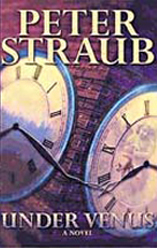

Under Venus
Oh, how Straub romanticized, how he wailed over, this, his so-called “lost book.” At least he had sense enough to understand that MARRIAGES, despite the fawning compliments of his fellow expatriates, could not stand as anything more than a desperately minor achievement. In the course of a transatlantic conversation after pub closing hours (Peter had discovered a pay telephone somewhere in the bowels of London which, if struck with sufficient force in just the right place, enabled him to dial the United States for the price of a local call) he confessed to me that he had completely rethought his ideas about narrative in the light of certain tactful remarks of mine and wished to make his second novel much stronger, that is, more an actual novel, than his first. Wonder of wonders, he intended it to have a plot!
In practice, this entirely welcome ambition meant that he swapped one set of influences for another. Instead of John Ashbery, Iris Murdoch, F. Scott Fitzgerald and John Hawkes, the guiding spirits of MARRIAGES, we find the mingled voices and strategies of John O’Hara, Iris Murdoch, Richard Stern, Saul Bellow, the very early Virginia Woolf and John Hawkes. No one could control such a circus of influence, and Peter certainly does not, yet in UNDER VENUS we can observe a greater maturity of characterization and scene-setting, the beginnings, faint but discernible, of something like narrative technique. Characteristically, my friend overreached himself and obscured what might have been a decent little novella about an expatriated artist’s return to his (of course) Philistine home town beneath yet another tired celebration of adultery and its guilts and. even more fatally, a political sub-plot. These strands do not so much mesh as collide, evidence, if evidence were needed, that Peter’s actual gifts, a matter I expressed quite forcefully to him over the length of a ten-page single-spaced letter which cost a veritable fortune in air mail postage, were unsuited to the literary novel.
Entirely apart from this consideration, to which we shall return, my stubborn friend ignored the wise suggestion that if his main character really had to be an artist of some sort — never a good idea — he should be a writer, for the sake of a minimal degree of authenticity. Instead, he persisted with the folly of making this character a musician, and even worse, a composer. I do not know why, but when novelists decide to write about artists, they invariably choose that art which they understand least. At this time, Peter knew even less about classical music than he does at present, and as far as he is concerned, musical composition is, as it were, a closed book. His version of the political process is only slightly less misinformed. The passages about adulterous love are both ridiculous and misguided. Yet touches here and there, a nicely observed detail, a moment of living dialogue, some passages of decent writing, and bits of mysticism imported more or less directly from Iris Murdoch, indicate that definite growth has taken place.
The rejection of this book by publishers on both sides of the Atlantic ultimately proved greatly beneficial, but its immediate effect was to put my friend into a profound slump. Some sort of crisis occurred, the details of which remain mysterious. Unwisely, Peter wasted far too much time rewriting, cutting and pasting, rewriting again. It is at such times that the support of an old pal can be most helpful, and I am pleased to say that the beleaguered author did at last finally take in an essential aspect of my ongoing advice, namely that he set this book aside and turn to a type of fiction far more suited than the mainstream literary novel to his modest gifts – the genre of the gothic. True, he needed to be told the simple rules and traditions of this humble form, but for once open to instruction, he proved a quick study. When he had absorbed an elementary grasp of the gothic from my lessons, he did a minor bit of reading on his own and began to write again. The two novels which emerged from this process, JULIA and IF YOU COULD SEE ME NOW, are the best to date of his career and seem likely to remain so.

Putney Tyson Ridge